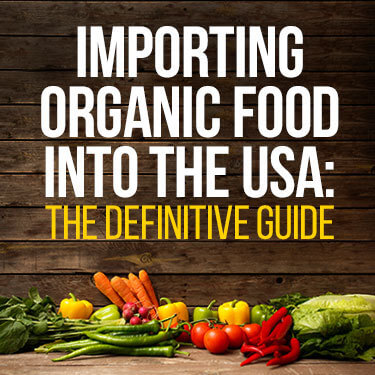
Importing organic food into the US has become popular due to many Americans opting to consume more organic food for their various health benefits. To keep up with demand, grocery stores require a reliable supply of food on their shelves at all times. Despite the popularity of organic food, importing it into the US is an extremely complex task to complete.
According to the United States Department of Agriculture (USDA), parties planning on importing organic food into the U.S. for resale must be certified by a USDA certifying agency. Additionally, the imported shipment must qualify under one of the following:
In this article, we will provide you with everything that you need to know about successfully importing organic food into the U.S.
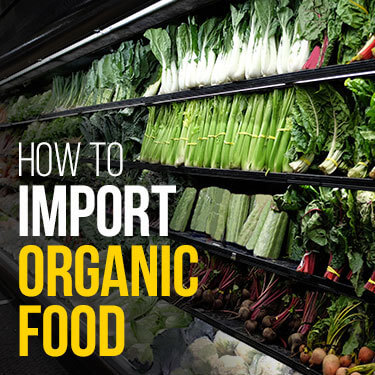
When it comes to bringing organic products into the country, you will have to abide by USDA organic agricultural product regulations. If you’re bringing organic products into the country for commercial purposes, you will also need to adhere to regulations outlined by Customs and Border Protection (CBP) and obtain a customs bond.
The USDA has specific regulations regarding the importation of organic products into the U.S. food market. Any organic products that are brought into the U.S. must adhere to USDA organic regulations or an authorized international standard.
Under the USDA organic regulations, organic products need to be imported from farms and businesses that are USDA organic certified. For a farm or business to obtain the USDA organic certification, they must first complete these five steps:
The USDA guidelines that farms/businesses must abide by various factors involved in agriculture. According to the USDA’s agricultural marketing service, these factors are:
The second option you can use to import organic food products into the country is the authorized international standard. Under the international standard, the U.S. permits importers to import shipments of organic food products from many different countries which have arrangements with the U.S. that allow them to sell organic food products. Those countries include:
In addition to having to import from one of these two types of countries, the U.S. has general import requirements that must also be followed. These include:
To improve the traceability of organic products, USDA published the Strengthening Organic Enforcement (SOE) final rule in January 2023. This rule outlines the use of a National Organic Program (NOP) import certificate.
As of March 19th, 2024, use of the NOP import certificate for all organic imports is mandatory. Exporters must request the document from an accredited certifier in the NOP’s Organic Integrity Database (OID).
The accredited certifier will identify the products as organic on all export documents, including:
Accredited certifiers will also provide the unique certificate number and release the document to the exporter. After the exporter receives the document, they’ll provide the information on it to the importer, who will have to file it in the CBP’s Automated Commercial Environment (ACE).
Import certificates can be provided for single shipments or multiple shipments within a specific time frame. However, this will depend on the oversight systems used by the certifier. Importers and exporters of organic food must be certified organic and listed in the OID to be included on the NOP Certificate.
Additionally, more parties involved in the import process must now be certified. Growers and processers are already certified under the pre-existing organics program, but other certified parties now include:
Related: Importing Food From Italy: A Ripe Opportunity
There are a few regulations that CBP upholds that you will need to abide by when importing organic food to the U.S. Imports of commercial goods that have a value of $2,500 or more will require a customs bond to import into the country.
Additionally, customs duties and tariffs will be required as well. CBP has agricultural specialists that will need to inspect your import of organic agricultural foods when they come into the country.
Our article discussing taxes on imported goods will give you more information about importation fees.

Worried about the Strict Regulations? Ask Our Experts.
Our Licensed Customs Brokers Will Personally Guide You.
According to data from 2017, about 16% of U.S. food imports were organic. Since then, there have been more imports of organic products in the U.S. than ever before from over 111 different nations.
The U.S. imports organic food from about 111 different countries. All of these options make choosing a particular country pretty stressful. To narrow your search down, start with the top five countries that import organic agricultural products to the U.S. in the table below.
| Organic Trading Partner | Import In U.S. Dollars | Percentage of Agricultural Imports |
| Mexico | $17 Billion | 38.46% |
| Canada | $5.2 Billion | 11.76% |
| Colombia | $2.7 Billion | 6.11% |
| Peru | $2.3 Billion | 5.20% |
| Guatemala | $2 Billion | 4.52% |
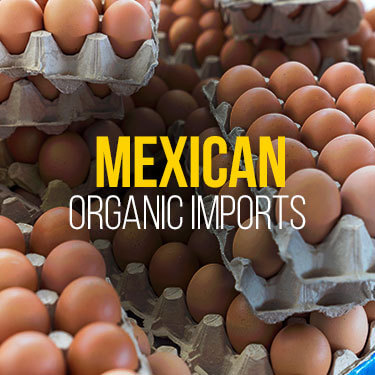
Mexico is one of the leading providers of organic products to the U.S. for a few reasons. For one, there are about 2,500 USDA-certified organic agricultural operations that are active in Mexico.
Just within one country, there are multiple operations that importers can choose as their supplier for food. The USDA also has accredited certifiers that can inspect other farms and businesses that want to be USDA certified.
As previously mentioned, Canada and the U.S. have an organic trade arrangement with each other. The arrangement that Canada and the U.S. have is under the NOP.
The NOP has established rules and regulations for organic agricultural goods that are imported into the country. Under the NOP, Canadian organic food products that are certified by the Canada Organic Regime (COR) will be considered organic and do not need USDA certification to be imported.
Canada has 7,300 organic operations which give importers a variety of different suppliers to choose from.
While Mexico and Canada take the lead as top suppliers of organic agricultural products for the U.S., there are plenty of other countries that you can import organic agricultural products from.
Colombia, Peru and Guatemala have organic agricultural operations that are USDA-organic certified while Canada and the U.S. have an organic trade arrangement with one another.
You can also import agricultural products from the countries that, like Canada, have organic trade arrangements between the U.S. and themselves. These countries are the Republic of Korea, Japan, Switzerland and the European Union (EU).
Any of these options will be acceptable and provide you with a quality shipment when importing organic food into the US.

Worried about the Strict Regulations? Ask Our Experts.
Our Licensed Customs Brokers Will Personally Guide You.
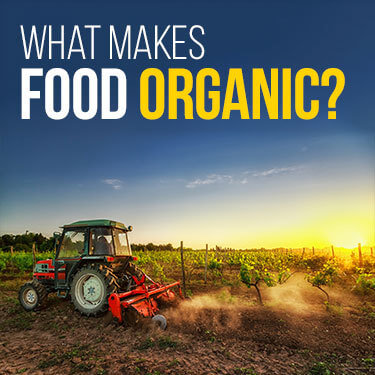
To ensure that imported agricultural products have the USDA-organic certification, it’s important to understand how the USDA defines agricultural products as organic. There are three types of agricultural products standardized by the USDA:
Naturally, each of these three types of products are held to different organic standards by the USDA.
For USDA to consider crops to be organic, they have to be grown under strict standards and practices. For example, produce has to be grown in soil that has been free of prohibited substances for at least three years before being harvested.
USDA considers most synthetic fertilizers and pesticides to be prohibited substances. Crop growth must also be managed using the following methods:
These management techniques have to be supplemented using crop and animal waste as well as with synthetic materials allowed by the USDA. The Code of Federal Regulations (CFR) Title 7, 205.600 provides details about substances that can and can’t be used.
Pests, weeds and diseases that could pose a threat to the health of crops must be dealt with using the following techniques:
Organic seeds and other organic materials must be used when the crops are planted. Lastly, genetic engineering, ionizing, radiation and sewage sludge cannot be used or in the soil when planting organic crops.
As with crops, USDA standards for organic meat are fairly strict. Many of the organic meat standards that the USDA enforces are quality living standards and proper livestock care. This includes:
In addition to these living standards, livestock has to be fed with agricultural feed that is also 100 percent organic and allowed to forage for food.
As with organic produce and meat products, organic multi-ingredient foods have some specific rules applied to them. These rules apply to the ingredients of the foods and how the foods are packed.
Multi-ingredient foods must not have artificial:
While these prohibitions are strictly enforced there are some exceptions allowed by USDA. Some of these exceptions are non-agricultural ingredients such as:
It’s imperative that if you’re importing multi-ingredient products, they have the proper labels applied to them.
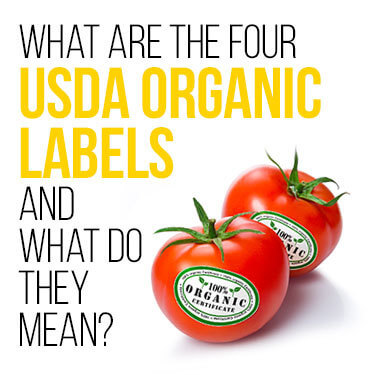
USDA uses four different types of labels for organic products, each of which has slightly different meanings. These four organic labels are:
While all organic products should have an organic label, not all of them will have the USDA Organic seal.
As the name implies, the 100% organic seal is used for agricultural products that contain 100 percent organic ingredients. Imports of this variety should have the USDA label and the name of the certifying agent.
The organic label is used for agricultural products that are made mostly of organic ingredients. Non-organic ingredients can be used in this product as long as they’re non-organic ingredients allowed in the National List.
While non-organic ingredients can have an organic label, only about five percent of all the ingredients for the product as a whole can be non-organic. Imports of these organic products must also have the name of the certifying agent and the USDA Organic Seal.
The “made with” organic ingredients label is for products that are made with no less than 70% of organic products. “Made with” specific organic ingredients label is for products that have less than 70% of organic ingredients within it.
The USDA Organic Seal is not permitted on these two types of organic foods. Products that have the “made with” organic ingredients label cannot be represented as organic by the farm or business that produced them.
However, at least three ingredients or categories of ingredients in these types of products can be called organic. Products that have been made with organic ingredients labels can list the organic ingredients within the product on the ingredient label.
If you need to import products that have no organic ingredients then consult our article about everything you need to know to import fruits and vegetables.
Importing organic food into the U.S. is a fairly challenging task for anyone to undertake. Luckily, a reliable customs broker can help you with the process. At USA Customs Clearance, we have many reliable customs brokers that can help you with your import needs.
Schedule a personalized, 1-on-1 consultation with a licensed customs broker and receive expert guidance custom tailored to your product and situation. They can walk you through everything from import regulations and USDA requirements, to import duties and more. Find out if you need:
Contact our team at (855) 912-0406 to start using our services today or complete our online contact form with a direct inquiry.

We work with you every step of the way to ensure a smooth and stress-free customs experience.
 Copy URL to Clipboard
Copy URL to Clipboard
Hi I am looking to import organic Certified packaged finished good. The product comes with a transfer certificate and my supplier is certified. Do I also need to be certified?